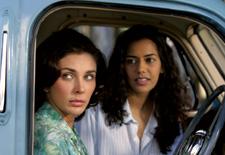For those of you out searching for a little lesbian love action, possibly still suffering from the absence of The L-Word, this November will be a month of salvation. There will be not one but two feature films released this month with female-on-female romance, both from British filmmaker Shamim Sarif. The World Unseen is in theatres Fri, Nov 7 and the more lesbionically titled I Can’t Think Straight comes out Nov 14. Both films star the lovely Sheetal Sheth and the equally hypnotizing Canadian actor Lisa Ray. Ray, in particular, will be familiar to fans for her work in Deepha Mehta’s films Bollywood/Hollywood and Water.
The World Unseen is a period drama set in South Africa in the 1950s, when apartheid practices and ideologies were beginning to take hold in the country’s Indian community. Based on Sarif’s novel of the same title, the film explores the intersection of two women’s lives: Amina, a free-spirited restaurateur who illegally employs a “coloured” business partner, played by Sheth, and Miriam, played by Ray, a traditional wife with secret eyes for better things. As the two friends confront and conflict with family, community and racial prejudices, an unlikely (although not entirely unexpected) friendship and attraction blossoms.
Sarif’s second film to be released in Canada will be the first feature film she directed, the romantic comedy I Can’t Think Straight. Like The World Unseen, I Can’t Think Straight is also a film about familial pressures and expectations, specifically, the expectation that daughters will fall in love, with men, and get married. Straight, set in contemporary Britain, is also a movie about prejudice and stereotypes, religious and cultural. This film’s friends turned lovers (again played by Sheth and Ray) are Tala, a London-based Palestinian who is about to be married, and a shy British Indian Muslim, Leyla. Once again love is both self-revealing and complicated as the two more-than-friends struggle to be true to themselves and to their desires.
As a filmmaker and an award-winning novelist, Sarif connects her work in print and in film to her devotion to storytelling. “The genre can vary,” says Sarif, “but what I hope to achieve in all my work is a strong storyline and characters that you can believe in and care about.”
In addition to her professed interest in creating complex, true-to-life stories, Sarif’s work also demonstrates a devotion to exploring the subject of sexuality as it intersects with culture and history. Love, of course, doesn’t happen in a vacuum. Love happens in history, in times of oppression and political struggle, and this is a crucial component of Sarif’s stories.
The broader cultural themes in these films resonate with Sarif’s own experiences with tradition and family. An artist with deep roots in South Africa, where her parents and grandparents were raised, Sarif grounds both films within Indian and South African cultures.
“We’re all brought up within certain traditions and family routines,” she says, “and for me the Indian and South African cultures were a big part of my upbringing, though in a liberal way. But there was very much a sense that people should get a ‘proper’ job that was secure and not necessarily artistic. That getting married, in a conventional sense, was important for a woman. I tried always to follow my heart and my head, which told me what I loved and enjoyed, and found ways to be rebellious without alienating too many people.”
Although both films are artfully directed and showcase some fabulous acting, I Can’t Think Straight may be slightly less appealing to veterans of queer cinema. Sarif’s first feature follows some fairly conventional storylines: girl meets girl when they both have boys, despite original differences girl and girl become friends, close friends, closer friends, bed. The World Unseen is a far more interesting creature to watch, weaving together multiple stories of love and rebellion, which circle around and add meaning to the story of the two women at its centre. The World Unseen seems to fit more with the message with which Sarif hopes audiences will leave her films: “That it’s good to question the rules that people follow. That thinking for yourself is an ability and a gift we all have as human beings, and that we shouldn’t be afraid to exercise that privilege, and then change things, a step at a time.”
For fans of fabulous female chemistry, both films are equally captivating. Sheth and Ray, whether alone or locked in desirous gazes, are stunning in these movies, with intense looks that could burn a hole through the screen. The connection these two women create for the camera is fabulous to watch.
For fans of love, sexy lovers, rebellious love in complicated times, check your local papers for movie times.

 Why you can trust Xtra
Why you can trust Xtra


